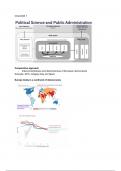Class notes
College aantekeningen The Governance and Politics of Social Problems (S_GPSP)
- Course
- Institution
Democracy and the constitutional rule of law (elections are not necessarily democratic): representative, liberal and parliamentary democracy in Europe; Majoritarian versus consensus democracy: logic of power sharing versus power concentration and the institutional frameworks related with these mod...
[Show more]



